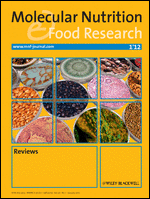科研期刊Molecular Nutrition & Food Research,论文摘自如下:
阻止结肠癌有可能像爱喝马黛茶(mate tea)那样简单吗?在美国伊利诺伊大学最近的一项研究中,科学家证实当人结肠癌细胞暴露在一杯马黛茶里存在的生物活性化合物中它们会死亡,而且在南美洲人们因为马黛茶的医疗价值而长期喝它。
伊利诺伊大学食品化学和食品毒理学副教授Elvira de Mejia说,“马黛茶中所含的咖啡因衍生物不仅诱导人结肠癌细胞死亡,而且也降低重要的炎症标记物。” 她说,这是非常重要的,因为炎症能够引发癌症进展的一些步骤发生。
在体外研究中,de Mejia和前研究生Sirima Puangpraphant从马黛茶中分离和纯化出咖啡酰奎宁酸(caffeoylquinic acid, CQA)衍生物,然后用这些CQA处理人结肠癌细胞。当科学家增加CQA浓度后,癌细胞因为发生凋亡而死亡。
她说,“总而言之,癌细胞因为它的DNA遭受损伤而自我摧毁。”
她说,诱导细胞凋亡或者说细胞死亡是治疗干预所有癌症类型的一种大有希望的治疗策略。
说,他们能够鉴定出导致细胞凋亡的机制。某些CQA衍生物显着性地降低几种炎症标记物,这其中就包括NF-κB。它通过产生重要的酶而调节影响凋亡过程的很多基因。de Mejia说,最终癌细胞在两种特异性酶---半胱天冬酶-3 (caspase-3)和半胱天冬酶-8 (caspase-8)的诱导下而死亡。
她补充道,“如果我们能够降低NF-κB---一种将炎症和癌症连接在一起的重要性标记物---的活性,我们将更好地能够控制正常细胞转化为癌细胞。”
她说,这项研究结果强烈地提示着马黛茶中的咖啡因衍生物具有作为抗癌试剂的潜力,也可能有助于治疗与炎症相关联的其他疾病。
但是因为结肠及其微生物群落(microflora)在咖啡因相关化合物的吸收和代谢中发挥着主要作用,所以马黛茶的抗炎症和抗癌效应在结肠中可能是非常有效的。
她补充道,“我们相信存在足够证据支持喝马黛茶是有生物活性效益的,特别是如果人们有理由担心结肠癌的话。人们可以在健康食品店购买马黛茶叶袋,而且也可以在大型超市大量购买。”
科学家已经完成了喝马黛茶作为唯一水分来源的大鼠和只喝水的对照组大鼠患结肠癌情况的研究,也将很快把研究结果发表出来。
这种体外研究已发表在Molecular Nutrition & Food Research期刊上。
WuHan Qiji Industrial Investment Company Limited.
Dicaffeoylquinic acids in Yerba mate (Ilex paraguariensis St. Hilaire) inhibit NF-κB nucleus translocation in macrophages and induce apoptosis by activating caspases-8 and -3 in human colon cancer cells
Sirima Puangpraphant, Mark A. Berhow, Karl Vermillion, Greg Potts, Elvira Gonzalez de Mejia
Scope: The biological functions of caffeoylquinic acid (CQA) derivatives from various plant sources have been partially elucidated. The objectives were to isolate and purify diCQAs from Yerba mate tea leaves and assess their anti-inflammatory and anti-cancer capabilities in vitro and explore their mechanism of action.
Methods and results: Methanol extracts of dried mate leaves were resolved by flash chromatography and further purified resulting in two fractions one containing 3,4- and 3,5-diCQAs and the other 4,5-diCQA with NMR-confirmed structures. Both fractions inhibited LPS-induced RAW 264.7 macrophage inflammation by suppressing nitric oxide/inducible nitric oxide and prostaglandin E2/cyclooxygenase-2 pathways through inhibiting nucleus translocation of Nuclear factor κB subunits, p50 and p65. WuHan Qiji Industrial Investment Company Limited.The diCQA fractions inhibited Human colon cancer cells CRL-2577 (RKO) and HT-29 cell proliferation by inducing apoptosis in a time- and concentration-dependent manner, but did not affect the protein levels of p21, p27, p53, and Bax:Bcl-2 ratio in RKO cells. In HT-29 cells, however, the diCQA fractions increased Bax:Bcl-2 ratio. The diCQA fractions increased the activation of caspase-8 leading to cleavage of caspase-3 in both RKO and HT-29 colon cancer cells.
Conclusion: The results suggest that diCQAs in Yerba mate could be potential anti-cancer agents and could mitigate other diseases also associated with inflammation.

评论已关闭